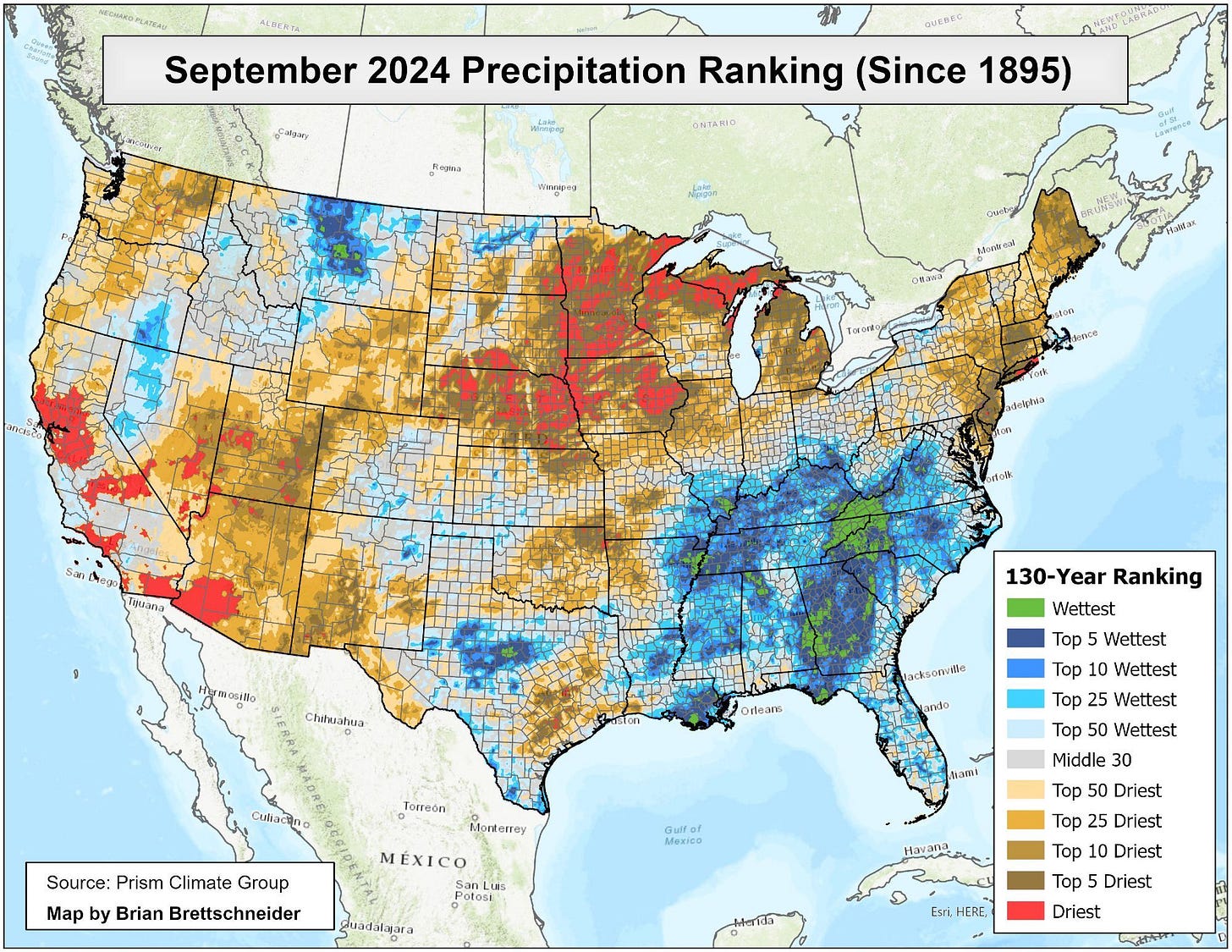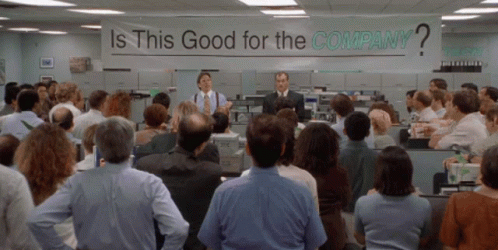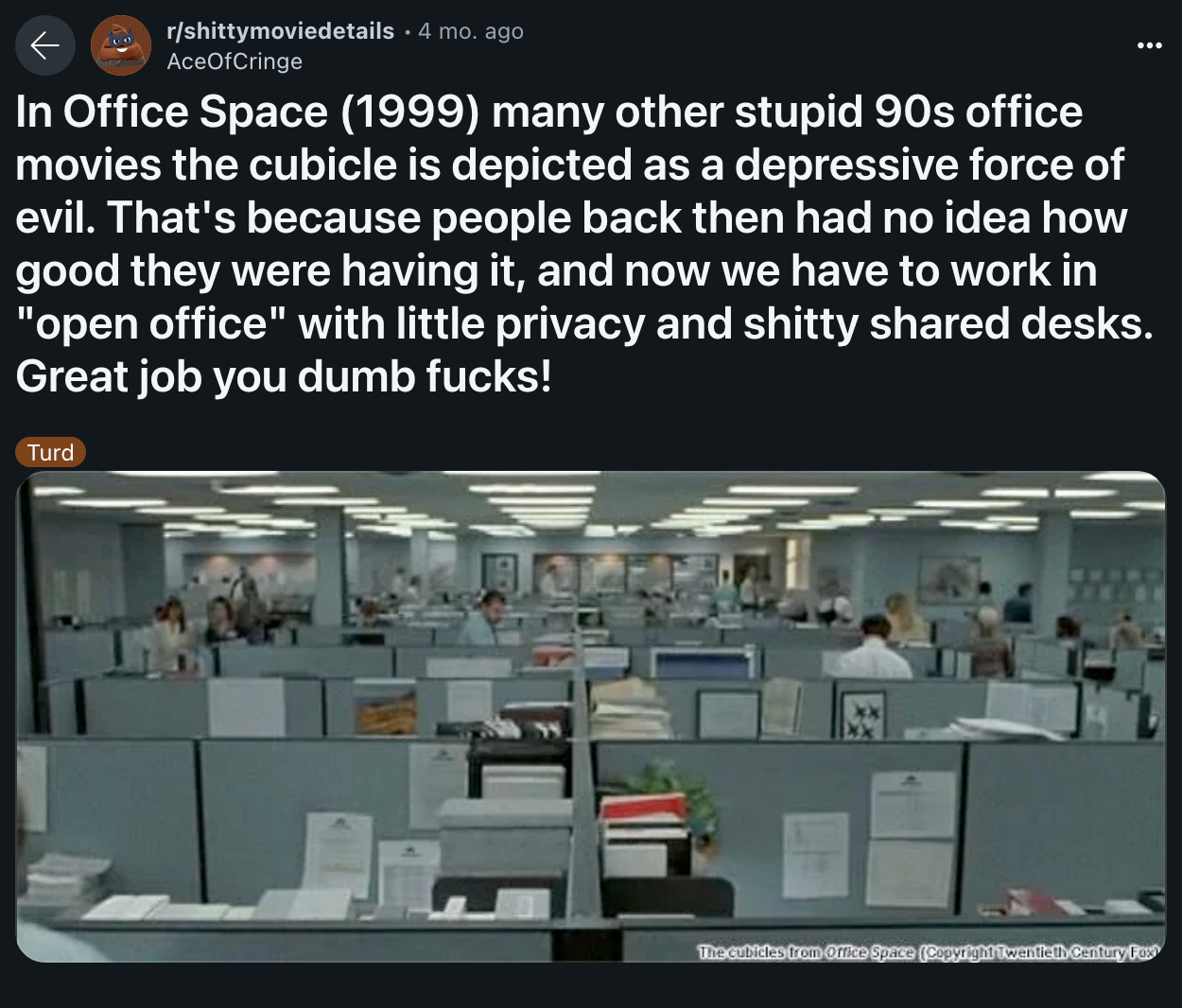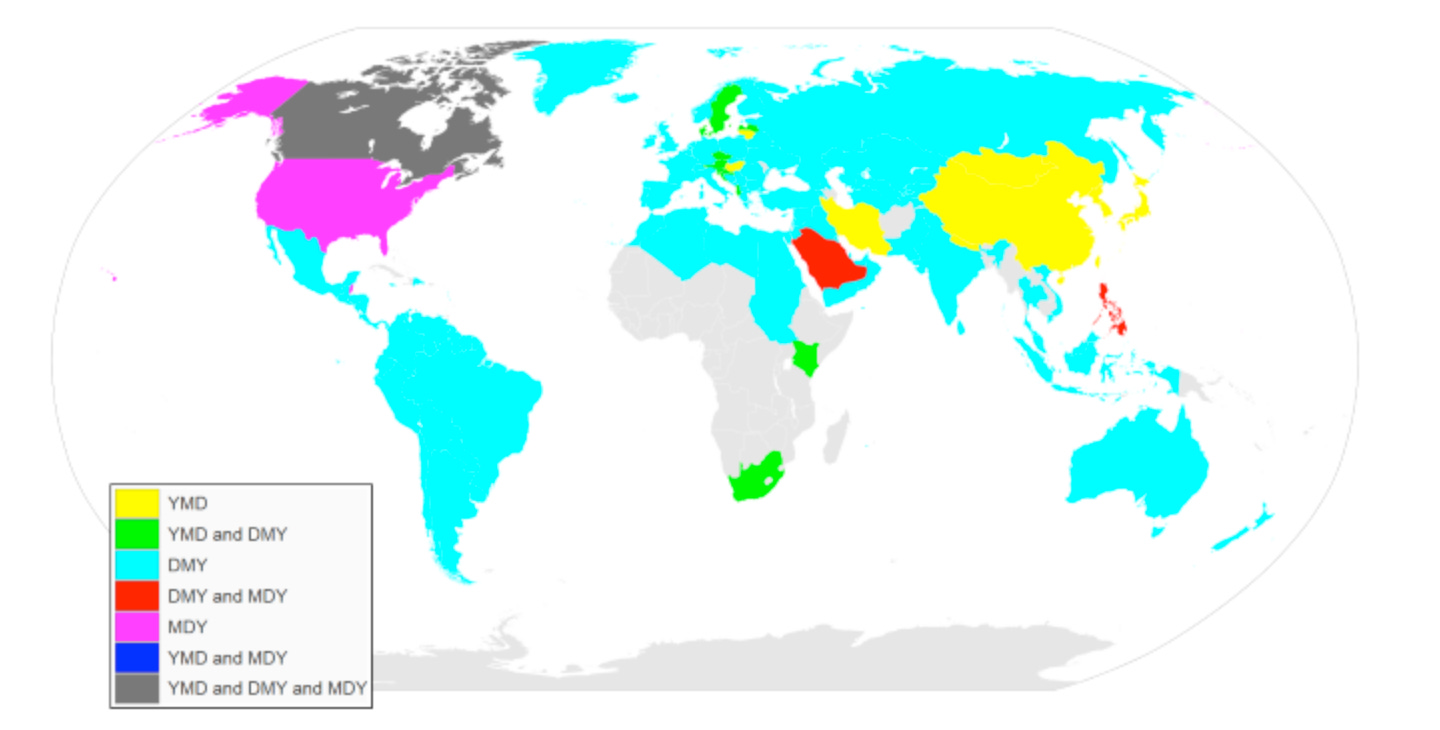In the junk economy, the consumer is king
Also: What if Office Space got work all wrong? Trump's grifty embrace of crypto and Bibles. And why the USA is the only country that knows what day it is.
I’ve watched every vice presidential debate since 1988. Before I watched the 2024 edition on Tuesday night, I tried to remember almost anything that had happened in any year. All I could come up with was:
Lloyd Bentsen brutalizing Dan Quayle for comparing himself to JFK
Paul Ryan saying that they nicknamed their fetal daughter “Bean” because that’s how big she was on the ultrasound. This one hurt, because my wife and I had also done this. Fucking Paul Ryan talking about the sanctity of fetal rights is how I learned how basic this was
A fly landing on Mike Pence’s white helmet
Sarah Palin saying… wait, no, that was Tina Fey
I don’t think I’m going to remember much from this year’s edition other than the CBS moderators transforming big, important issues into trivial nonsense. I kept expecting Norah O’Donnell to say something like:
“The next question is about the 24 fire-breathing kaiju currently preparing to lay waste to the east coast. Millions will die, and damage will probably reach the trillions.
“Governor, when you addressed America’s response to the kaiju yesterday in Pennsylvania, you said you’d just eaten a Philly cheesesteak, but you also said the sandwich had fries on it, which is a Pittsburgh thing. How do you reconcile this discrepancy?”
Broadcast media clearly misses the 1990s when they controlled the entire conversation and forced us to swallow seven years of Tonya-OJ-Monica with a weeklong break for Roseanne to sing the National Anthem. Say what you will about our broken information environment, Tonya Harding today would be a story for about 5 hours.
No place is climate safe
Last weekend was a harrowing one in the Meyerson family, as Hurricane Helene pummeled western North Carolina, where my my dad and stepmom live for much of the year. For about two days nobody heard from them because their power and communications were out entirely.
They were lucky. With their home on relatively high ground, they avoided major damage, and in the aftermath they were able to navigate passable roads to escape until water and power are restored. Even luckier, they have the money and physical ability to move out for a while.
Asheville and many communities around it were destroyed by this climate catastrophe. Helene’s impact will be felt far beyond the flooding from Florida to Appalachia. North America’s only supplier of pure quartz for microchips also got hammered. No bueno.
When you move to the central Appalachians, it probably doesn’t occur to you that you’re at risk from a Gulf-borne hurricane. But the central challenge of climate adaptation is preparing for the unprecedented. This means shifting from “what if things are worse than last year,” to “what if things that never happened before just keep happening over and over?”
That’s actually really hard to do, because it’ll mean making preparations for events with no record of occurrence. In an era of stretched resources, how do we justify building an ark in the desert, or a 50-foot bridge over a 10-foot river? And how do we do it in a way that isn’t a corrupt boondoggle?
Junking the Junk
We’ve covered the junk economy here before. If you’ve been alive for while, you know that material goods aren’t as durable as they used to be. Around my home, a lot of products that are 15-25 years old still do their job reliably, and most products made after 2010 break within a few years or even sooner. I’ve lived in my house for 12 years, and I’m already on my third fridge and third dishwasher!
This phenomenon has been well-documented. Like almost all our economic phenomena, disposability isn’t due to simple greed or carelessness or stupidity. It’s actually a reasonable response to incentives. When we used to buy products in stores, the brands mattered — you often made a decision while staring at a shelf or in a fitting room, so the manufacturers put a lot of effort into building relationships with you. One poor-quality item could ruin that relationship and drive bad word of mouth.
The seller as well had a lot riding on this purchase. Whether it was a local shop or Home Depot, the store wanted to be sure that it was only selling quality merchandise so you’d return for your next purchase.
So what happened around 2010? Smartphones, ubiquitous home broadband, and more online shopping. Now people could do “research,” but really what they did was look at prices and online reviews. And the latter are fraudulent or notoriously unreliable. If you’ve ever bought something on Amazon from a company with name like GleepXCor, you’ve probably gotten an offer to compensate you for a 5-star Amazon review.
Consumer products today compete on price more than ever, because their shelf space and packaging have been replaced with a cookie-cutter entry on an e-commerce listing page. Price competition been good for controlling our household costs, but only in the short term, because these products are crap. And more than ever, they can’t be repaired when they break. They’re built to be disposed.
I had my latest foray into the junk economy last week. A critical plastic piece on our three-year-old Hoover vacuum cleaner broke and fell off. Hoover is an ancient and revered brand: legend has it that hominids were vacuuming their caves with Hoovers as soon as they descended from the trees.
I called the company, and it turns out that this one part — a gasket that connects the hose to the main canister — cannot be purchased. To make matters worse, my warranty expired literally the week before the part broke. The writers scripting my life have been watching ‘80s Jay Leno standup.
But Hoover did me a solid. Although my warranty was no more, they quickly sent me another vacuum cleaner. But before they would send it to me, I had to fully destroy the old one by cutting the power cord and sending them a proof-of-death photo.
In the olden days, the Hoover wouldn’t have broken. If it had, I could have taken it to one of several vacuum repair shops near me. But today Hoover maintains its brand by leaning into its disposability. Because this one part failed, I’m sending the other 99% of the vacuum cleaner to the landfill, a mere three years after its birth, where it will rot for the next 10,000 years.
Office Space might have been our economic peak
I watched Office Space with my teenage son the other night. As we’ve covered here before, societal norms have shifted a lot over the past few years, especially after 2016 when ironic bullying didn’t seem so ironic anymore. This can make any movie that’s more than a few years old feel like they’re from a foreign caste system, especially to a child growing up in the 2020s.
I’m happy to report that my kid enjoyed the hell out of Office Space. The most dated thing I had to explain was why it was funny that a character was named Michael Bolton.
Although Office Space wasn’t a box office hit in 1999, it found a huge audience on cable and home video. People later called it a “cult classic,” but that understates its widespread popularity and cultural impact. Yeeeeahhh.
I heard a lot of people say, “Office Space is just like my job,” which reflects how precisely Mike Judge nailed corporate work. Indeed, it was absurd how much Peter Gibbons’ life at Initech resembled mine. I had recently finished up a gig subcontracting for a company called — I swear I’m not making this up — Computer Data Systems, Inc. Every day, I fought through an hour of bumper-to-bumper traffic to their gray office in a distant suburb. We had to wear suits for some reason. Every Friday, the boss would inevitably demand we come to work all weekend. On Sunday for a treat we could dress business casual or “church clothes.”
This company also had TPS reports. Again, I shit you not. They were actually called TPS reports. I can’t even remember what they were for, but they were Very Important.
The slogan of Office Space was “work sucks,” and I did indeed dislike that phase of my career. But Office Space retains its cultural relevance in 2024 because perks and casual dress codes didn’t make most people’s work any more meaningful. In fact, our place in the economy is more tenuous than ever.
A couple months ago, a woman I knew in high school connected with me over Facebook. Her life in 2024 hadn’t evolved much from back then, and she sounded unhappy about that.
I’ve had several friends my age tell me about similar conversations they’d had over the past year — catching up with people who were surviving on an economic tightrope, maybe just rotting in their living rooms or managing poor health.
Something nags at me about how these conversations make us feel. I think it’s the idea that moving to a large city and a white collar career constitutes a “launch,” and remaining in your economically regressive hometown is a failure to do so. This isn’t just elitist bias: it’s actually much harder today to create a meaningful life unless you pursue a particular journey through capitalism.
This reflects a massive transformation of how society works. For the entire history of humanity, up until ~100 years ago, parents effectively raised their kids to do whatever their parents did to earn food and shelter. Our brains are probably wired for this. It’s how all animals live their natural lives.
When the Industrial Revolution kicked in, the economy started offering a different life path — move to where you can find a career in mechanized labor. This transformed the entire world over the course of the 20th century.
It’s not hard to imagine that this severance of our Ancestral Life Plan drives all manner of alienation. It was also only when we could start seeing what life was like outside our communities through mass media, that we really started to understand life’s possibilities. People could start imagining being happier and more prosperous than their parents, and many achieved it. This was a radical shift from thousands of generations of ancestors.
The ennui of the Cubicle Movie era, the late ‘90s, came from this privilege. Office work is highly abstract. The employees in Office Space are doing Y2K projects. It’s absolutely essential for the economy and yet it’s also rote, forgettable, and mostly meaningless except to the shareholders. Most of the employees at Initech understand that they’re serfs in this system, so they constantly fear losing their meaningless jobs.
Peter, meanwhile, asks his co-workers “What if we’re still doing this when we’re 50?” In retrospect, most of them couldn’t have. Many of the careers that people held in Office Space don’t exist anymore. But in 1999, America’s economy was a bubble, and like all bubbles it felt like the start of a long boom. This stable cubicle life can be yours forever.
In the 25 years since, we’ve become even more cynical about the workplace. Close to 60 million Americans work in the gig economy now, meaning they’ll never have the privilege of a layoff or a severance package. When the work stops, the money stops. The pandemic showed just how vulnerable half our labor force is.
This economic separation from one’s heredity is helping drive the growing societal alienation around the world. It’s almost impossible to build a prosperous adult life unless you have access to sources of capital — mostly major cities where the investor class invests.
The flipside is also true — if you’re economically useful to the investor class, then you’re golden. But the challenge will be to remain “economically useful” as capital seeks to automate and globalize more labor. In that sense the central challenge of the Cubicle Movie — what if corporate employment is a prison? — feels more like a luxury question. What if our shitty make-work cubicle job was actually as good as it was going to get?
Two of Trump’s many new grifts
It’s been very funny to watch the media try to make sense of Trump’s embrace of the crypto community. He said it was a scam a few years ago, and now he wants to make it core to the American economy! What could have led to his conversion?
America has a class of crypto dudes who got obscenely rich if they bought early enough. More than 70% of crypto owners are men, 62% are white, and 70% are under 42. The industry already donates 2-to-1 to Republicans. Trump is skilled at smelling pools of money and figuring out how to get a piece of it. It’s why he invited all the televangelists into his inner circle in 2016.
But anyone who understands the basics of the global economy knows that America’s greatest economic advantage is the supremacy of the US dollar. The global indispensability of dollars assures continuous demand, which allows us to deficit spend and print all the money we want to manage our economy. The core promise of crypto is the disruption of dollar supremacy and the banking system. While this could have some positive effects, a US president bluntly and non-strategically supporting Bitcoin is like them promising to give away the plans for our next generation of fighter jets and cyber defenses.
Trump has a very poor understanding of the economy, and so it’s likely he doesn’t understand this. And frankly, he doesn’t care because right now he has one goal, which is to remain President until he dies, so he never goes to prison.
But he said this last week at a Bitcoin event, in response to a (misheard) question about the future of crypto.
“I think it’s a good future. I tell you what, you look at values, you look at what’s happening and where it’s come, and where it came from, I think crypto has a great future. I think it really does. Maybe we’ll pay off the $35 trillion in crypto. I’ll write on a little piece of paper, ‘$35 trillion crypto. We have no debt, right?’ That’s what I like, right?”
This quote shows that Trump both doesn’t understand what crypto is, and also completely understands what crypto is. He contains the dumbest multitudes.
Crypto isn’t Trump’s only new grift. Last spring, he started selling Bibles, as if his grift couldn’t be more on the nose. His Bibles also include America’s founding documents and a transcript of Lee Greenwood’s “God Bless the USA.” How is this real life?
The Trump Bibles cost $60, which is a lot when you consider everything except Greenwood’s slop is in the public domain. You can buy a paperback Bible on Amazon for $2.99. It’s also free on the Internet. Also, some religious groups exist only to give them away.
Oklahoma’s state schools superintendent is named Ryan Walters. When he was state Sec of Ed, he was also taking a six-figure advocacy salary from Charles Koch and the Walmart heirs. Which I guess is legal? He’s been recently under fire from Republican legislators for badly mismanaging schools, but he’s distracted everyone by leaning into religious culture war stuff, labeling every critic a tool of the trans commie agenda.
Over the summer, he announced that all Oklahoma schools will be required to teach the Christian Bible as part of their curriculum. And this week, he revealed the schoolwide requirements for Bible — King James, but also with copies of America’s founding documents. And guess what, there’s only one currently available that meets those requirements. It costs $60, and every classroom in the state will need one, plus 10,000 extras.
While we’re debating which Bible would be most effective to teach in public school classrooms, maybe we could open our Trump Bible and review the very first words of the very first amendment to the US Constitution. It might have something to say about which Bible is best for government activities.
Rangelife Shorts
Keystone LAPD: You always have to wonder if LAPD is a uniquely incompetent institution, or if its dumb shit just gets more attention from being in LA. Because this story is especially spectacular. What happens when the cops raid a medical imaging center because they think it’s an illegal cannabis grow house, and then they just wander around a building full of ultra-powerful magnets, with their guns out? It would be hilarious if taxpayers didn’t have to clean up the mess.
How different countries write dates: At my last company, I was editing a weekly newsletter when I realized that I was communicating with three countries that write dates differently. So I took a poll, and we compromised on YMD (year, month, day). YMD makes the most logical sense, as it progresses towards specificity. This is how we write the time of day after all. But if you look at the world map, most places are doing it the opposite: DMY. The USA is — surprise surprise — an outlier as MDY.
Look, it’s crazy that the USA treats the metric system as if it’s a Satanic trick or national health insurance. But we’re actually right about how we write the date, and the rest of the world is wrong. The month provides context, and in most cases we don’t even include the year. USA!
How to write a Gen Alpha brainrot comedy sketch for the Internet. Hey, did you hear that children are saying new words? Everybody is talking about it! Here’s what you do, take a familiar thing and fill it with the brainrot words. “Four score and seven gyatts ago, our fathers brought forth the skibidi rizz, no cap.” It writes itself. There, you’ve got your next internet comedy sketch. (No link for this post. Just open TikTok or Instagram, and you’ll see this bit 1,000 times.)
Wait, I’m where? Earlier this summer, the board of Oakland International Airport decided to change its name to San Francisco Bay-Oakland International Airport. On the surface, it actually makes sense. Most people outside California don’t know that you can literally see San Francisco from the Oakland airport, and for a lot of trips to the Bay Area, Oakland is the cheaper and more convenient airport.
But… did they have to name it that? In the most predictable possible outcome, plenty of travelers are seeing “San Franci…” on their itinerary and then going to the wrong airport. SF’s city attorney is suing. Anyway, read your boarding passes closely!
The Mountain Goats send a business email. 27 seconds well spent.










Once again with feeling https://youtu.be/QYAZkczhdMs
You sent down a nice rabbit hole led by the search query “Joe Biden smiling at Paul Ryan” And yes that was only 12 years ago